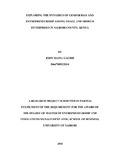| dc.contributor.author | Gachie, John, M | |
| dc.date.accessioned | 2017-01-10T06:43:44Z | |
| dc.date.available | 2017-01-10T06:43:44Z | |
| dc.date.issued | 2016 | |
| dc.identifier.uri | http://hdl.handle.net/11295/100088 | |
| dc.description.abstract | Gender bias is discrimination based on cultural systems of behaviour linked to the sexes which can bring constraints in entrepreneurship. In Kenya, gender differences tend to show a disadvantaged and weaker status of women in social, political, economic, legal, educational and physical spheres. This has been a challenge to the development and overall success of the government of Kenya strategy on the advancement of entrepreneurship. The aim of this study was to establish the influence of gender bias among Small and Medium Enterprises in Nairobi County with emphasis paid to SMEs involved in consultancies, services, products and goods within the CBD (central business district). The study applied descriptive research design in collecting data by use of purposive sampling of 20% of the population of 990 SMEs licensed by the Nairobi City Council in 2016. Primary data was collected for this study through the use of questionnaires. Generated data was analysed using descriptive statistics and inferential statistics with the aid of SSPS (Statistical Program for Social Sciences) Version 20.0 and presented in tables. Findings from the study showed that social capital or networks; access to funding; time for family and business; risk perception or aversion; access to business support; awards of business tenders; and collateral to obtain loans had the greatest effect on entrepreneurship and gender bias. Traditions and beliefs were also found to affect the entrepreneurship with their tendency to formulate issues that affected gender. Family background and benchmarking opportunities had the least impact. The study concludes that gender bias positively and negatively influences entrepreneurship among small and medium enterprises. The study recommends the creation of business networks by entrepreneurs for sharing ideas and useful business linkages. It also recommends review of business development and monitoring programs; women and youth funds; SMEs involvement in aggressive brand promotions and international trade exhibitions. Finally, it recommends enhancement of government policy and regulations around the dedicated provision of public procurement tenders for women, youth and persons with disabilities to ensure that only deserving cases are awarded. | en_US |
| dc.language.iso | en | en_US |
| dc.publisher | University of Nairobi | en_US |
| dc.rights | Attribution-NonCommercial-NoDerivs 3.0 United States | * |
| dc.rights.uri | http://creativecommons.org/licenses/by-nc-nd/3.0/us/ | * |
| dc.subject | Exploring the Dynamics of Gender Bias and Entrepreneurship Among Small and Medium Enterprises | en_US |
| dc.title | Exploring the Dynamics of Gender Bias and Entrepreneurship Among Small and Medium Enterprises in Nairobi County, Kenya | en_US |
| dc.type | Thesis | en_US |



